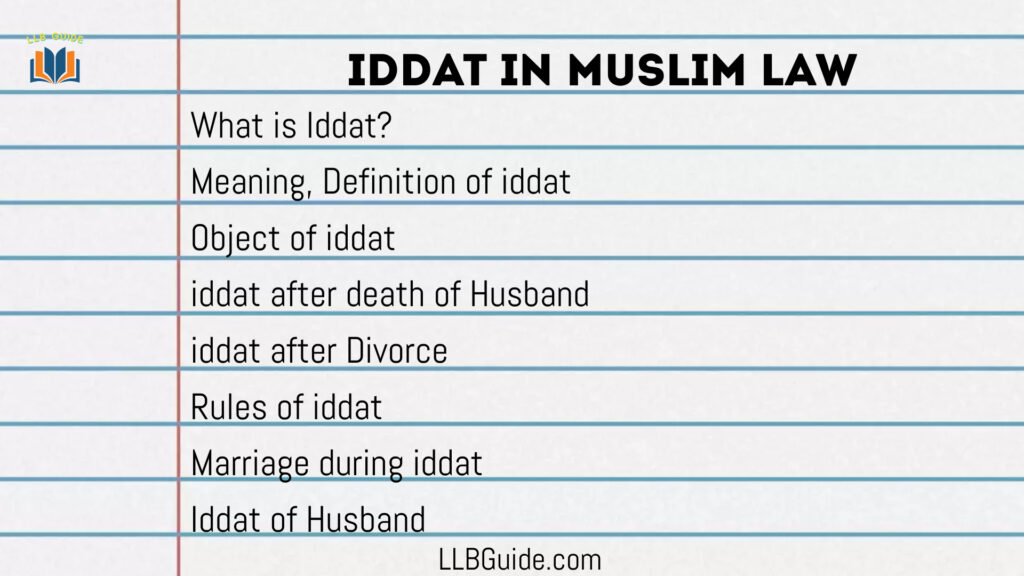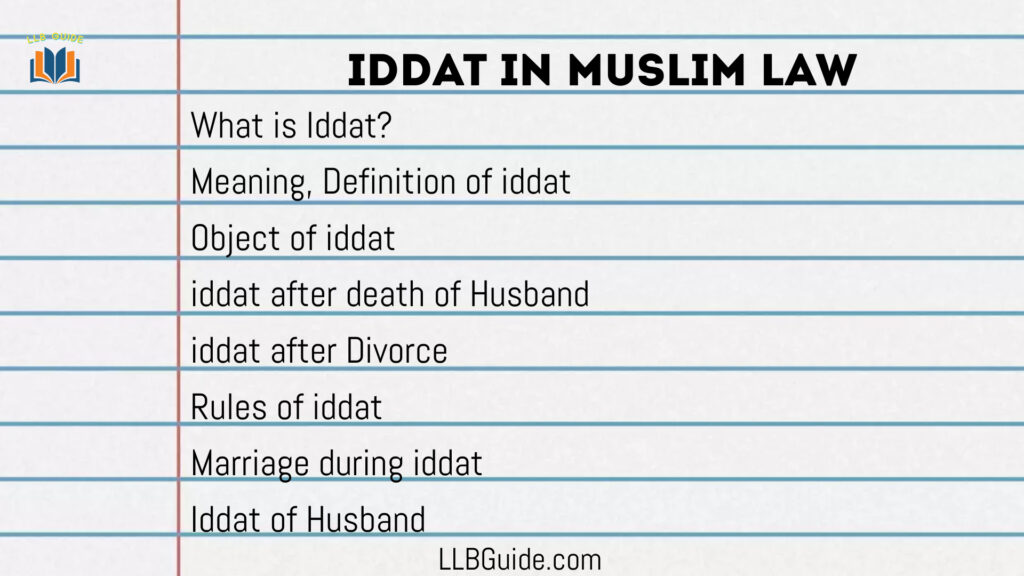Iddat in Muslim Law refers to a time period that a Muslim woman is bound to observe when her husband dies or divorces her. The iddat period of a widow and a divorced woman is described differently in Islamic law. Usually, the place of iddat is the house of her husband but in case of divorce which is irrevocable, a woman observes her iddat in her parent’s house. The woman shall mourn her husband (if he dies) by praying to ALLAH ALMIGHTY, and she is not allowed to beautify herself or wear fancy dresses during her iddat period.

Table of Contents
Iddat in Muslim Law
The whole concept of iddat in Muslim law is explained below.
What is Iddat?

Iddat in Muslim law is a period that a Muslim woman must observe after dissolution of marriage either by divorce or death of her husband. Iddat is observed in the same house (her husband’s house). A woman must observe her iddat period in order to get married again. It is a time period specified in Sharia law to check the pregnancy of such a woman. In case the divorce is irrevocable a woman observes her iddat in her parent’s house.
The period of iddat in Islamic law is different for a widow and a divorced woman which is explained later in this article.
Iddat Meaning
Iddat is an Arabic word that means ‘number or counting’.
Iddat Definition
Iddat is defined as a period that a woman observes after the divorce or death of her husband.
Object of Iddat
Iddat under Muslim law is observed by a woman after the dissolution of marriage whether, in case of divorce or death of her husband, the object of iddat is:
- to mourn
- to check pregnancy
Period of Iddat
Period of Iddat in Muslim law in different scenarios is explained below which are:
- Iddat after the death of husband
- Iddat after divorce
Iddat after the Death of Husband
According to the Holy Quran:
‘And those among you who die and leave behind wives, (these wives) should keep themselves waiting for four months and ten days’. (2:234)
Iddat in Islam of a widow can be specified in further two circumstances:
If she is pregnant
According to the Holy Quran:
‘And as for pregnant women, their term shall end with delivery’. (65:4)
The object of iddat is to check pregnancy, if it is already clear that she is pregnant, the time period of her iddat will continue till the birth of such child.
If she is not pregnant
The widow will observe the period of iddat for 4 months and 10 days if she is not pregnant in the light of the following situations:
- even marriage was complete
- marriage was not consummate
- she was below the age of puberty
Iddat after Divorce
According to the Holy Quran:
‘Women who are divorced shall wait, keeping themselves apart, three (monthly) courses’. (2:228)
Iddat after dissolution of marriage by divorce may be calculated in two ways:
If Marriage Was Consummated
If Menstruate
The period of iddat according to the Quran shall be observed for three menstrual periods.
If She Does Not Menstruate:
1. Due to Pregnancy:
If the woman is pregnant at the time of divorce she will observe the iddat period till the birth of such child, even the child born the very next day of divorce.
2. Due to Other Reasons:
Other reasons may include any medical reasons she may have, in case she is not menstruating, she will observe the iddat period for 3 lunar months.
Case Law
1992 SCMR 1273
In this case, an appellate bench of the Federal Shariat Court declared that the period of Iddat maybe 39 days.
If Marriage Was Not Consummated
There will be no period of iddat in case the marriage is not consummated.
Rules of Iddat
One of the objects of Iddat in Muslim law is to mourn for her husband. A woman observing the period of iddat is prohibited to:
- to leave the house without any emergency
- to do makeups
- to put on fancy dresses.
Death of Husband during Iddat
If a woman was observing the Iddat period after divorce and her husband died before the completion of the period of iddat. Under such circumstances, she becomes a widow and will start a fresh iddat period which will be 4 months and 10 days. She is also entitled to maintenance and inheritance.
Commencement of Iddat Period
The period of iddat always starts at the time of dissolution of marriage either by divorce or death of husband. In case a woman does not come to know that her marriage is dissolved in any mentioned way, her iddat period will automatically start at the time of such dissolution.
Marriage during Iddat
Marriage during the period of iddat under different schools of thought is described below:
- According to Shia law: It is void
- According to Sunni law: It is irregular
Iddat of Husband
There is only one condition for the iddat of the husband under Muslim law. In case a man has four wives and divorces one of them, he will also observe the iddat period like his wife before getting married again. This provision is added in Sharia law just to ensure that in case he remarriages but dies before the period of iddat of his divorced wife has not come to an end, there will be 5 widows of him which can not be.
Conclusion
Iddat in Muslim law of a widow if she is not pregnant is for 4 months and 10 days, and if she is pregnant then till the birth of a child. Iddat under Muslim law of a divorced woman is three menstrual periods or till delivery of a baby or for 3 lunar months if she has any medical issues in case the marriage was consummated, if the marriage was not consummated then there will be no period of iddat.
FAQs
What are the rules of iddah?
A woman observing the period of iddat is prohibited from leaving the house without any emergency, doing makeup, or putting on fancy dresses.
What is the meaning of iddat?
Iddat is an Arabic word that means ‘number or counting’.
What is the time period of iddat?
For widows it is 4 months and 10 days or till delivery, for divorced it is three menstrual periods or till delivery of a baby or 3 lunar months.
What is the requirement of Iddat?
Iddat is observed by only Muslim women.
What are the three types of iddah?
Iddat under different circumstances may be 4 months and 10 days or three menstrual periods or till delivery of a baby or 3 lunar months.

